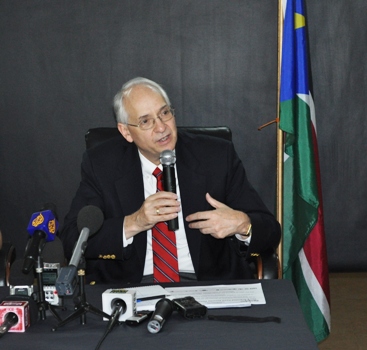US reiterates commitment to end South Sudan conflict
October 9, 2014 (WASHINGTON) – The United States will support South Sudan in ending its “senseless” conflict, reconciling their communities and realising the promises made to the young nation, Donald Booth, Washington’s special envoy to the two Sudans said on Thursday.

“It is critically important that the country’s political leaders – on all sides of this senseless conflict – understand the disappointment that is shared by its friends, inside of government and out, in Washington and across the United States,” said Booth.
“But it is equally important that the people of South Sudan know that the commitment of their friends in America will endure; it will outlast the senseless war that now grips the country,” he added.
Violence hit South Sudan in late last year, killing thousands and displacing nearly 1.5 million people, with about 90,000 of them seeking refuge within United Nations protection of civilian camps. This week, aid agencies operation in the young nation warned of looming famine early next year, should the conflict rage on.
For many years, he said, successive US administrations, individuals and institutions enjoyed special relationship with the people of South Sudan, dating back to the long civil war years with Sudan as well as the struggle for peace and self-determination.
“When the South Sudanese chose independence in 2011, all of us shared in the sense of promise. And that is why, just three years later, the conflict that erupted in December 2013 and quickly spiraled out of control prompted not only shock, but a sense of sadness, and of disappointment, at the opportunity squandered,” said Booth.
LEADERSHIP FAILURE
The conflict, Booth said, was “a collective failure by those who had helped to deliver South Sudan its independence, not least among them the dominant political party that controlled government – the SPLM”.
He indentified weak institutions, over-centralisation, slow progress in security sector reform, corruption and financial mismanagement and unresolved war-era tensions between communities as some of the root causes of the nearly 10-month-long conflict in the country.
According to Booth, avoiding future conflict demands one to understand the current crisis and shape a credible transition and sustainable peace, which “requires a wider lens, a look to the broader context and dynamics that set the stage for this year’s war”.
The US government is the leading international donor to South Sudan, and is providing significant humanitarian assistance to the hundreds of thousands of South Sudanese citizens displaced or otherwise affected by the crisis since December 2013.
Last month, Washington announced additional $83 million in support of South Sudan, bringing to over $720 million the total US emergency assistance for its crisis in fiscal year 2014.
(ST)
